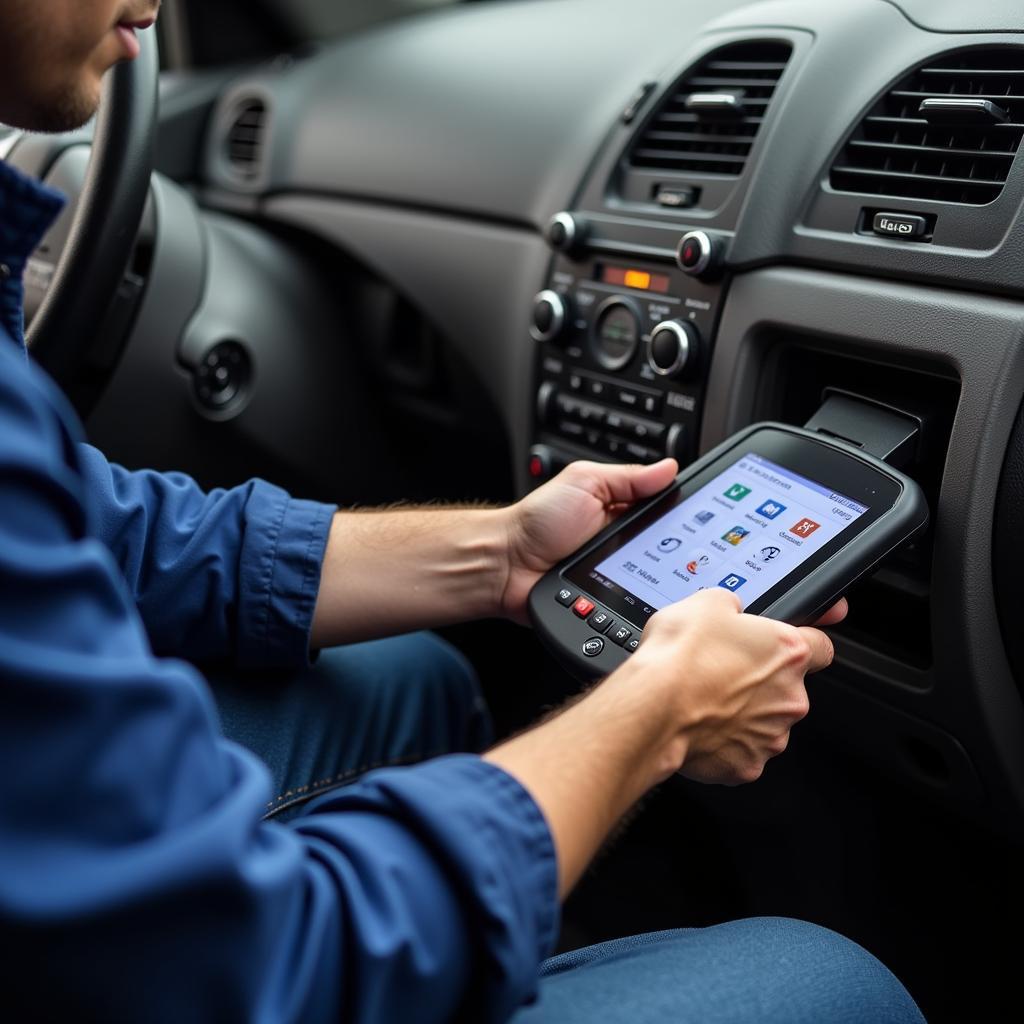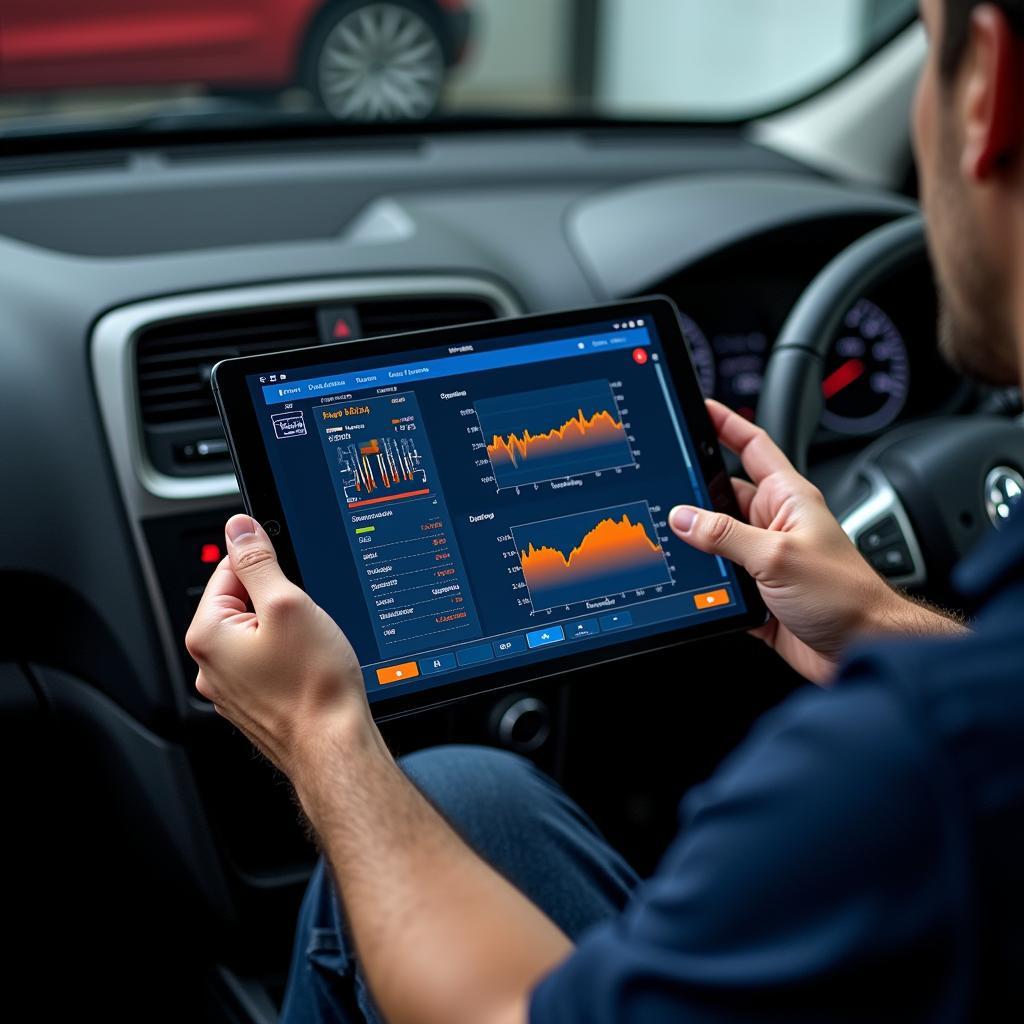Navigating the world of car diagnostics can feel overwhelming, especially with the abundance of tools available. At the heart of this intricate system lies the car diagnostic computer, a powerful tool capable of unlocking the secrets hidden within your vehicle’s electronic brain. Choosing the right Computer For Cars Diagnostics is crucial, whether you’re a seasoned mechanic or a car enthusiast looking to delve deeper into your vehicle’s health. This article will guide you through the intricacies of selecting the ideal diagnostic tool, equipping you with the knowledge to make an informed decision.
Understanding the Power of a Car Diagnostic Computer
Gone are the days of relying solely on mechanical expertise to diagnose car problems. Modern vehicles are equipped with sophisticated computer systems, known as Electronic Control Units (ECUs), which monitor and control various aspects of the car’s performance. A car diagnostic computer acts as your window into these systems, allowing you to:
- Retrieve Diagnostic Trouble Codes (DTCs): These codes pinpoint specific areas within the vehicle’s systems that require attention, acting as a starting point for your diagnostic journey.
- Read Live Data Streams: Access real-time information from various sensors, providing insights into the engine’s performance, transmission behavior, and more.
- Perform Actuator Tests: Command specific components, like fuel injectors or solenoids, to activate, aiding in isolating faulty parts.
- Program and Configure Modules: Certain diagnostic computers offer the capability to program new modules, adjust settings, and update software, essential for modern vehicle maintenance and repair.
 Car Diagnostic Computer in Action
Car Diagnostic Computer in Action
Key Factors to Consider When Choosing a Diagnostic Computer
The market offers a wide array of car diagnostic computers, each with varying features and capabilities. To simplify the selection process, consider these crucial factors:
1. Vehicle Compatibility: Your Starting Point
Before delving into the technical specifications, ensure the diagnostic computer you choose is compatible with your vehicle’s make, model, and year. The most common communication protocol used in modern vehicles is the On-Board Diagnostics II (OBD-II), but older vehicles might require specific adapters or software.
2. Functionality: Striking a Balance between Basic and Advanced
- Code Readers: These entry-level devices primarily retrieve and clear DTCs, ideal for DIY enthusiasts tackling basic troubleshooting.
- Scan Tools: Offering a step up, scan tools provide access to live data streams, enabling you to monitor sensor readings and analyze performance in real time.
- Professional Diagnostic Scanners: Packed with advanced features like bi-directional control, module programming, and specialized tests, these are essential tools for professional mechanics working on a wide range of vehicles.
3. User Interface and Software: Prioritizing Ease of Use
A user-friendly interface can significantly impact your diagnostic experience. Look for devices with intuitive menus, clear navigation, and well-organized data presentation. Consider factors like screen size, resolution, and the availability of software updates to ensure a smooth and efficient workflow.
4. Connectivity and Updates: Staying Ahead of the Curve
Most modern diagnostic computers offer USB, Wi-Fi, or Bluetooth connectivity for data transfer and software updates. Wireless connectivity enhances mobility and allows you to access online databases and resources directly from the device. Regular software updates are crucial for staying current with the latest vehicle models and diagnostic protocols.
 Mechanic Analyzing Diagnostic Data on Tablet
Mechanic Analyzing Diagnostic Data on Tablet
5. Budget and Value: Investing Wisely
Car diagnostic computers span a wide price range, from affordable code readers to high-end professional scanners. Determine your specific needs and budget constraints to find the best value for your investment.
“Investing in a quality car diagnostic computer is an investment in your vehicle’s longevity. It empowers you with the knowledge to address issues proactively and avoid unnecessary repairs.” – John Miller, Senior Automotive Engineer
Common Questions About Car Diagnostic Computers
What is the difference between OBD-I and OBD-II?
OBD-I, introduced in the late 1980s, was an early attempt at standardizing vehicle diagnostics but lacked uniformity across manufacturers. OBD-II, implemented in 1996, provided a universal system for accessing diagnostic information, making it easier for mechanics to diagnose and repair vehicles from different manufacturers.
car computer diagnostic halfords
Can I use a diagnostic computer on any car?
While OBD-II is the standard for most modern vehicles, compatibility can vary. Always verify the diagnostic computer’s compatibility with your specific vehicle’s make, model, and year to ensure seamless operation.
Do I need a professional-grade diagnostic computer?
For basic troubleshooting and maintenance, a code reader or scan tool might suffice. However, professional mechanics and those working on a wide range of vehicles benefit from the advanced capabilities of professional diagnostic scanners.
Expanding Your Diagnostic Horizons
Choosing the right computer for cars diagnostics empowers you to delve into the complexities of your vehicle’s electronic systems. Whether you’re a DIY enthusiast eager to unravel the mysteries under the hood or a professional mechanic seeking to elevate your diagnostic capabilities, understanding the nuances of these powerful tools is essential.
Remember, investing in a quality car diagnostic computer is not just about fixing problems; it’s about gaining a deeper understanding of your vehicle and ensuring its optimal performance for years to come.
diagnostic scan tool for australian cars
Need expert guidance in choosing the right diagnostic tool for your needs? Contact our team of specialists at WhatsApp: +1(641)206-8880 or Email: cardiagtechworkshop@gmail.com. We’re available 24/7 to assist you on your diagnostic journey.

Leave a Reply